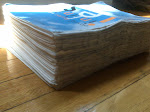Along with coming out in the first person, "He"/ Hal /DFW also subtitles this chapter, on page 851 - as "Gaudeamus Igitur" (or, "Let us rejoice therefore," the first line from the song De Brevitate Vitae):
From Wikipedia:
"De Brevitate Vitae" (on the Shortness of Life), more commonly known as the Gaudeamus, is a popular academic commercium song in many European countries, mainly sung or performed at university graduation ceremonies. Despite its use as a formal graduation hymn, it is a jocular, light-hearted composition that pokes fun at university life. The song dates back to 1287[1] and was already known by the time of the founding of the alma mater of all European universities, the University of Bologna. It is in the tradition of carpe diem (seize the day), with its exhortations to enjoy life.It has been known as a beer-drinking song in many ancient universities and is the official song of many schools, colleges, universities, institutions, and student societies.
The lyrics reflect an endorsement of the bacchanalian mayhem of student life while simultaneously retaining the grim knowledge that one day we will all die. The song contains humorous and ironic references to sex and death, and many versions have appeared following efforts to bowdlerise this song for performance in public ceremonies. In private, students will typically sing ribald words.
The song is sometimes known by its opening words "Gaudeamus igitur" or simply "Gaudeamus". In the UK, it is sometimes affectionately known as "The Gaudie". The many centuries of use have given rise to numerous slightly different versions.
Johannes Brahms quoted the hymn in the final section of his Academic Festival Overture. Sigmund Romberg used it in the operetta The Student Prince, which is set at the University of Heidelberg.
The Lyrics:
Gaudeamus igitur
Juvenes dum sumus.
Post jucundam juventutem
Post molestam senectutem
Nos habebit humus.
Let us rejoice therefore
While we are young.
After a pleasant youth
After a troubling old age
The earth will have us.
Ubi sunt qui ante nos
In mundo fuere?
Vadite ad superos
Transite in inferos
Hos si vis videre.
Where are [they] who before us
Were in the world?
Go to the heavens
Cross over into hell
If you wish to see them.
Vita nostra brevis est
Brevi finietur.
Venit mors velociter
Rapit nos atrociter
Nemini parcetur.
Our life is brief
Soon it will end.
Death comes quickly
Snatches us cruelly
It spares no one.
Vivat academia!
Vivant professores!
Vivat membrum quodlibet
Vivant membra quaelibet
Semper sint in flore.
Long live the academy!
Long live the professors!
Long live each student!
Long live all students!
May they always be in their prime!
Vivant omnes virgines
Faciles, formosae.
Vivant et mulieres
Tenerae amabiles
Bonae laboriosae.
Long live all girls
Easy and beautiful!
Long live mature women also,
Tender and lovable
Good [and] productive.
Vivat et respublica
et qui illam regit.
Vivat nostra civitas,
Maecenatum caritas
Quae nos hic protegit.
Long live the state as well
And he who rules it!
Long live our city
[And] the charity of benefactors
Which protects us here!
Pereat tristitia,
Pereant osores.
Pereat diabolus,
Quivis antiburschius
Atque irrisores.
Let sadness perish!
Let haters perish!
Let the devil perish!
Let whoever is anti-student
As well as the mockers!
Monday, August 3, 2009
Subscribe to:
Post Comments (Atom)


No comments:
Post a Comment
Surely You Jest...